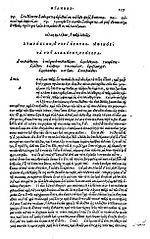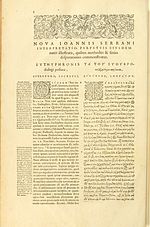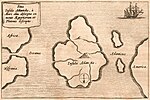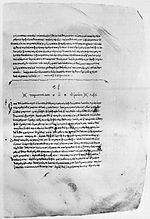characters are Socrates, the boys Lysis and Menexenus who are friends, as well as Hippothales, who is in unrequited love with Lysis and therefore, after the initial...
19 KB (2,886 words) - 09:22, 6 July 2024
Allegory of the cave (redirect from The Cave (Plato))
Plato's allegory of the cave is an allegory presented by the Greek philosopher Plato in his work Republic (514a–520a, Book VII) to compare "the effect...
25 KB (2,900 words) - 01:33, 3 September 2024
authored by Plato around 375 BC, concerning justice (δικαιοσύνη), the order and character of the just city-state, and the just man. It is Plato's best-known...
65 KB (8,531 words) - 10:38, 5 September 2024
The Hunt for Virtue: Beauty, Truth and Goodness Nine Dialogues by Plato: Pheadrus, Lysis, Protagoras, Charmides, Parmenides, Gorgias, Theaetetus, Meno &...
92 KB (9,373 words) - 10:39, 5 September 2024
(dialogue), a dialogue of Plato about friendship (philia) Lysis of Taras (fl. c. 5th century BCE), Greek philosopher Lysis, one of the stages of the lytic...
545 bytes (109 words) - 16:09, 5 November 2021
Theory of forms (redirect from Form (Plato))
realism is a theory widely credited to the Classical Greek philosopher Plato. The theory suggests that the physical world is not as real or true as "Forms"...
38 KB (5,117 words) - 01:27, 24 July 2024
Ἀπολογία Σωκράτους, Apología Sokrátous; Latin: Apologia Socratis), written by Plato, is a Socratic dialogue of the speech of legal self-defence which Socrates...
33 KB (4,389 words) - 17:38, 23 August 2024
romanized: Sympósion, lit. 'Drinking Party') is a Socratic dialogue by Plato, dated c. 385 – 370 BC. It depicts a friendly contest of extemporaneous...
40 KB (5,468 words) - 11:17, 7 August 2024
Menexenus (redirect from Menexenus (Plato))
confused with the character of the same name who appears in Plato's dialogues Menexenus and Lysis. Socrates' sons Menexenus and Sophroniscus were still children...
1 KB (100 words) - 08:02, 2 August 2023
Plato's theory of the soul, which was inspired variously by the teachings of Socrates, considered the psyche (Ancient Greek: ψῡχή, romanized: psūkhḗ)...
15 KB (1,817 words) - 17:32, 25 August 2024
Euthyphro (redirect from Euthyphro (Plato))
(/ˈjuːθɪfroʊ/; Ancient Greek: Εὐθύφρων, romanized: Euthyphrōn; c. 399–395 BC), by Plato, is a Socratic dialogue whose events occur in the weeks before the trial...
25 KB (3,491 words) - 04:37, 1 September 2024
Platonic Academy (redirect from Plato's Academy)
variously known as Plato's Academy, the Platonic Academy, and the Academic School,[citation needed] was founded at Athens by Plato circa 387 BC. Aristotle...
27 KB (3,447 words) - 22:00, 29 August 2024
Platonism (redirect from Plato, Platonism)
philosophy of Plato and philosophical systems closely derived from it, though contemporary Platonists do not necessarily accept all doctrines of Plato. Platonism...
33 KB (3,973 words) - 03:01, 4 September 2024
Phaedo (redirect from Phaedo (Plato))
Plato, Phaedo, 82d–85b. Plato, Phaedo, 85b–86d. Plato, Phaedo, 86d–88b. Plato, Phaedo, 88c–91c. Plato, Phaedo, 100c–104c. Plato, Phaedo, 63c. Plato,...
30 KB (4,488 words) - 04:41, 8 July 2024
In Plato's Republic, the character of Socrates is highly critical of democracy and instead proposes, as an ideal political state, a hierarchal system...
4 KB (519 words) - 21:05, 24 June 2024
Crito (redirect from Plato's Crito)
[krítɔːn]) is a dialogue that was written by the ancient Greek philosopher Plato. It depicts a conversation between Socrates and his wealthy friend Crito...
44 KB (5,822 words) - 11:48, 13 May 2024
Atlantis (section Plato's dialogues)
romanized: Atlantìs nêsos, lit. 'island of Atlas') is a fictional island mentioned in Plato's works Timaeus and Critias as part of an allegory on the hubris of nations...
97 KB (11,760 words) - 20:44, 26 August 2024
Socrates (section Plato and Xenophon)
theory of love is mostly deduced from Lysis, where Socrates discusses love at a wrestling school in the company of Lysis and his friends. They start their...
90 KB (11,563 words) - 01:33, 27 August 2024
Analogy of the divided line (redirect from The divided line of Plato)
translit. grammē dicha tetmēmenē) is presented by the Greek philosopher Plato in the Republic (509d–511e). It is written as a dialogue between Glaucon...
18 KB (2,104 words) - 13:18, 18 August 2024
Some 250 known manuscripts of Plato survive. The following is a partial list of manuscripts of Plato's dialogues. There are 51 Byzantine manuscripts in...
18 KB (322 words) - 09:18, 6 July 2024
Parmenides (dialogue) (redirect from Parmenides (Plato))
Παρμενίδης) is one of the dialogues of Plato. It is widely considered to be one of the most challenging and enigmatic of Plato's dialogues. The Parmenides purports...
30 KB (4,443 words) - 09:16, 6 July 2024
Socratic dialogue (redirect from Plato dialogues)
the fourth century BC. The earliest ones are preserved in the works of Plato and Xenophon and all involve Socrates as the protagonist. These dialogues...
14 KB (1,623 words) - 14:27, 7 June 2024
The Epistles (Greek: Ἐπιστολαί; Latin: Epistolae) of Plato are a series of thirteen letters traditionally included in the Platonic corpus. With the exception...
23 KB (3,176 words) - 16:24, 19 June 2024
Laws (dialogue) (redirect from Laws (Plato))
The Laws (Greek: Νόμοι, Nómoi; Latin: De Legibus) is Plato's last and longest dialogue. The conversation depicted in the work's twelve books begins with...
22 KB (2,689 words) - 16:57, 2 September 2024
Theaetetus (dialogue) (redirect from Theaetetus (Plato))
Θεαίτητος Theaítētos, lat. Theaetetus) is a philosophical work written by Plato in the early-middle 4th century BCE that investigates the nature of knowledge...
30 KB (4,229 words) - 20:09, 5 August 2024
Timaeus (dialogue) (redirect from Plato's Timaeus)
(/taɪˈmiːəs/; Greek: Τίμαιος, translit. Timaios, pronounced [tǐːmai̯os]) is one of Plato's dialogues, mostly in the form of long monologues given by Critias and Timaeus...
26 KB (3,435 words) - 17:45, 1 September 2024
Meno (redirect from Meno (Plato))
Meno (/ˈmiːnoʊ/; Greek: Μένων, Ménōn) is a Socratic dialogue written by Plato. Meno begins the dialogue by asking Socrates whether virtue is taught, acquired...
18 KB (2,464 words) - 08:13, 30 August 2024
Anamnesis (philosophy) (redirect from Anamnesis (Plato))
In Plato's theory of epistemology, anamnesis (/ˌænæmˈniːsɪs/; Ancient Greek: ἀνάμνησις) refers to the recollection of innate knowledge acquired before...
8 KB (1,071 words) - 18:53, 26 August 2024
Myth of Er (redirect from Er (Plato))
(/ɜːr/; Greek: Ἤρ, translit. ér, gen.: Ἠρός) is a legend that concludes Plato's Republic (10.614–10.621). The story includes an account of the cosmos and...
13 KB (1,770 words) - 13:54, 3 May 2024
Ion (dialogue) (redirect from Ion (Plato))
In Plato's Ion (/ˈaɪɒn/; Greek: Ἴων) Socrates discusses with the titular character, a professional rhapsode who also lectures on Homer, the question of...
9 KB (1,264 words) - 23:44, 29 June 2024














